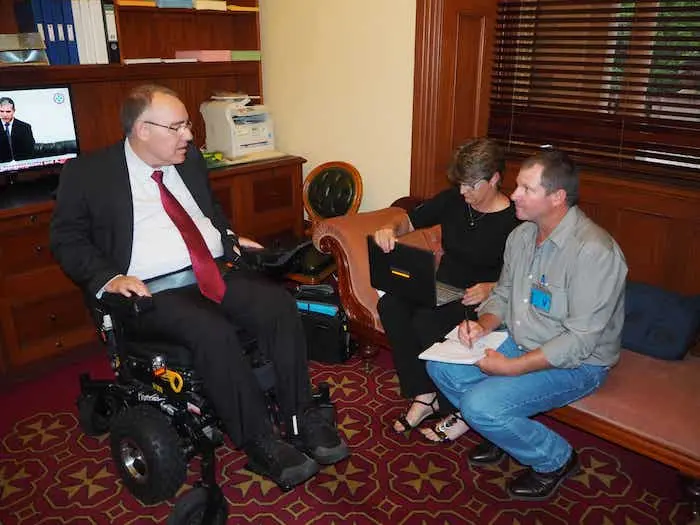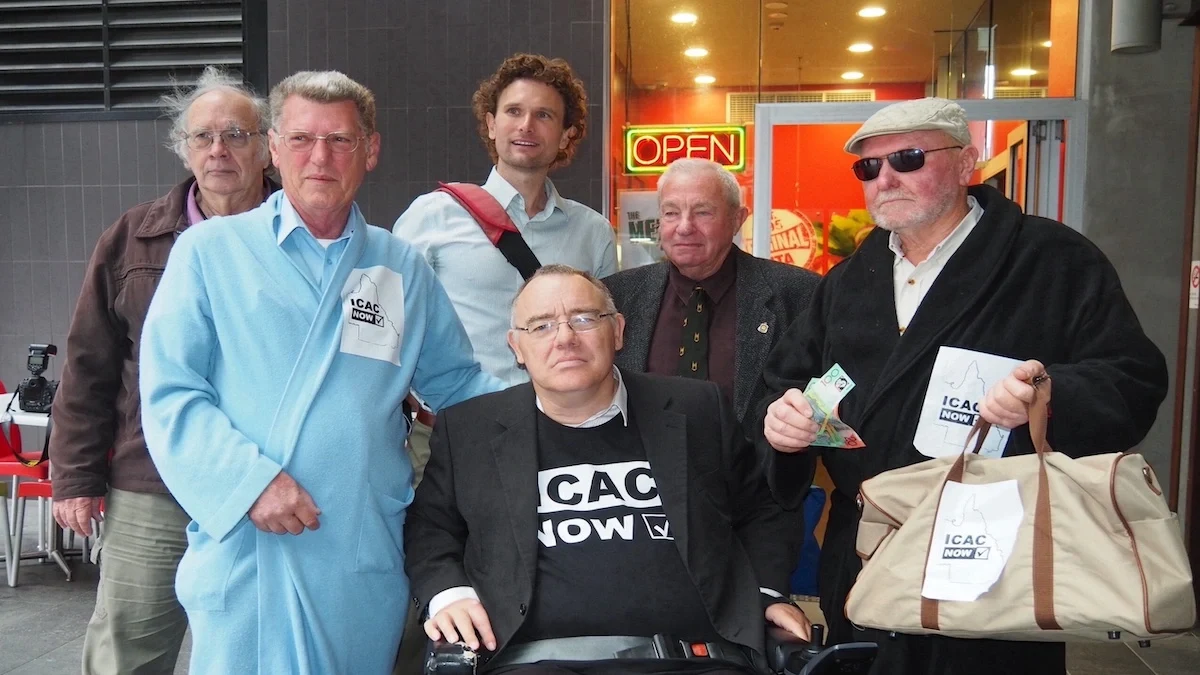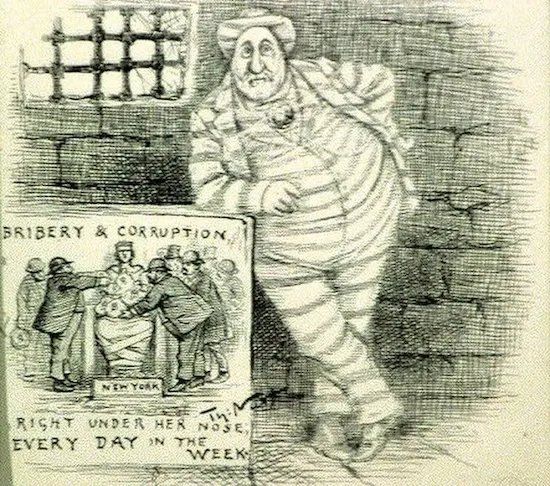Local Government Corruption in Queensland: “The report tabled in Parliament today demonstrates why reform of the local government sector is required. If supported by Parliament, the package of recommendations in my view will result in the most substantial reform of the local government sector in Queensland’s history.
– Alan Mr MacSporran (Crime and Corruption Commission – 2018)
Table of contents
- Council Corruption
- Corruption in Government
- Intellectual Support
- A Game of Mates
- Local Government Corruption in Ipswich
- The Truth Emerges
- Whole-of-Government Response
- Crime and Corruption Commission Qld
- Legislative Action
- Ipswich Local Government Corruption
- Fraser Coast Council Corruption
- More Charges
- Defamation Used to Silence Critics
- Other Public Sector Corruption
- Conclusion
- All Chapters:
Council Corruption
Local government corruption was not a surprise to me. Corruption is at least as old as political representation itself. However, I wanted action on my concerns about systemic corruption.
I was determined to repeal changes the previous Newman Government had made to the Local Government Act. Their amendments greatly expanded the powers of mayors, increasing the opportunity for corrupt conduct. For instance, Newman’s changes granted mayors individual power to prepare Council budgets and the power to direct not just the CEO, but also other Council managers.

I met with Jackie Trad, the then Deputy Premier and Minister for Local Government. I nominated some legislative reforms that would reduce local government corruption. As a former Councillor, I had experience in local government and understood the legislation and local government processes. Trad did not understand and would not act.
The newly elected Palaszczuk Government was more concerned with maintaining ‘special relationships’ with Queensland Mayors than considering my reforms. They wanted to have the support of as many mayors as possible, to boost their popularity and increase their chances of re-election. In terms of public sector corruption, there was a distinct lack of appetite to ‘root it out’. Government MPs were happy to simply look the other way.
There is a long history of corruption at the local government level. The corrupt Tammany Hall political machine, which dominated local government in New York city for over a century, is featured in many movies and novels. Frank Hardy’s novel Power Without Glory focuses on local government corruption in inner-city Melbourne.
Jason, Lyn and Council Corruption
During 2015, I met with two people from the Atherton Tablelands, a cattle farmer by the name of Jason Ward and Lyn O’Connor, a former consultant to the dairy industry. They contacted me regarding corruption in local government.
Lyn and Jason embraced the issue of corruption like zealots, flying to Brisbane several times with documents for me to table. With their network of contacts, and Lyn’s administration skills, Lyn and Jason became a formidable investigative team.

Lyn O’Connor and Jason Ward
Trad Hostile
When I started to table documents they were providing, it caused quite a stir and embarrassment to Deputy Premier Trad. As a result, she contacted me several times to dissuade me from tabling allegations against local government figures. However, I would not yield. In one of our last phone calls, in an aggressive tirade, Trad referred to me as a “disloyal cunt”. I later resigned from the ALP and led a campaign for an investigation into local government corruption across Queensland.
The campaign quickly gathered momentum. People throughout the state contacted us claiming to know of corrupt actions by their local councils. After that, Lyn and Jason had to ‘separate the wheat from the chaff’, selecting the well supported accounts of corruption. In addition, our campaign led to professional investigations by experienced journalists.
Our anti-corruption campaign gained support from many groups in the community, such as the Environmental Defenders Office (EDO). The EDO wanted stronger anti-corruption laws, because they knew money could buy inappropriate development. This included payments to obtain approval for unsustainable mining projects and inappropriate high density towers in urban areas.
Corruption in Government
In New South Wales, the Independent Commission Against Corruption (ICAC) was kicking goals with a number of high profile convictions. However, here in Queensland, having the under-resourced and underpowered Crime and Corruption Commission (CCC) as our ICAC was a bit like having a pussy cat as a watchdog.
It made sense to me to simply increase the power of the CCC, but others wanted to start from scratch, and many of our supporters started using the slogan, “Queensland ICAC Now!”
Intellectual Support
I wanted strong academic support for our campaign. To this end, I met with Dr. Timothy Prenzler from the University of the Sunshine Coast, an international authority on corruption prevention.
Prenzler believed the number of unresolved allegations had reached such a high level that the only way to clear the air was through a review. He wanted an Assessment of Reform in Post-Fitzgerald Queensland and new laws to fix the problem.
Professor Prenzler also stated, “The Corruption Commission has conducted public opinion research which consistently shows that 90 percent of Queenslanders want complaints against police, public servants and local government officials to be independently investigated, but by its own admission the Commission investigates less than two percent of complaints”.
Professor Prenzler
“Ordinary citizens with a genuine complaint, and government insiders with evidence of unethical conduct, feel they have nowhere to go,” Prenzler said.
“Too many genuine complainants and professional stakeholders, including journalists, lawyers and academics believe the CCC has lost its way. It is overly focused on organised crime at the cost of public sector misconduct. A big part of the problem concerns perceptions of undue influence and favouritism.”

A Game of Mates
Two other academics, Professor Paul Frijters and Dr. Cameron Murray, were also focused on the issue of corruption. They examined the inefficiency and economic damage caused by corrupt behaviour.
Initially, they investigated land rezoning by the Urban Land Development Authority (ULDA) (land rezoned by the ULDA increased in value by hundreds of millions of dollars). Drs. Frijters and Murray then published the book ‘Game of Mates’, exposing the corruption club.
Telling Parliament about the Game
I read from Game of Mates in Parliament:
Mr PYNE (Cairns—Ind): I would like to talk about the new book, “Game of Mates: How favours bleed the nation”, by Cameron Murray and Paul Frijters. It is the story of how Australia became one of the most unequal societies in the Western world while merely a generation ago it was one of the most equal. It is the story of how a group of mates have come to dominate our corporate and political sectors and have managed to rob us, the Australian majority, of half our wealth.
To understand how the game of mates is played, we must see Australia through the eyes of our villain, whom we call James. This book is about how the Jameses of this country play their game of mates.
The villain, James, swings no sword. He instead swings his power in the halls of parliament, in the media and in the complex bureaucracies of government and large corporate enterprises. James robs you of a hefty part of your superannuation. He dodges tax so you pay more. You pay higher interest rates on your mortgage. Higher transport costs and higher medical costs, because James and his mates take a cut.

Social Decay
Economist and social scientist Mancur Olson described the process of social decay resulting from what we call the game of mates as ‘institutional sclerosis’. He observed that over time all institutions succumb to the power of special interest groups that impose great economic cost on the community as they reallocate wealth towards themselves.
Call to Action
If any country can rise up and fight the Jameses, it is ours. The authors hope that this book can help in this fight by providing alternatives. Just one alternative is to establish a public competitor to supply the products James sells to reduce his collusive power; set up a state superannuation fund, like other countries do, to compete with the private ones; or set up a state bank. James thrives on the lack of competition, so let us give him some. James will protest, as the authors personally discovered. He will play dirty.
Journalists who wanted to report their research in the areas of property development and infrastructure projects had their jobs threatened. In addition, James will tell bald-faced lies. One favourite is that there is already intense competition between superannuation firms and banks.
When pushed, James will enact reforms but twist them again in his favour to ensure any change is superficial, or he may introduce more bureaucratic rules, for land rezoning for example – something only he knows how to navigate, while others do not. The authors argue that James’s gain impoverishes our media, as James’s opinion buys airtime.”
Local Government Corruption in Ipswich
In 2016, a fellow MP handed me a document entitled “Ipswich Inc.” This document detailed allegations of corrupt acts by Ipswich Mayor Paul Pisasale. Pisasale had been extremely popular during his 13-year Mayoral reign, winning more than 83% of the vote on one occasion. Consequently, political leaders were all keen to have a good relationship with him.
I had heard rumours about Pisasale, and I had complete trust in the MP who handed me the document. Therefore, I agreed to table the document in Parliament. It provided evidence of what I had been saying all along about council corruption.
The Member who handed me “Ipswich Inc.” remained in the ALP, so she could do nothing with it. Pisasale was well connected, but that did not worry me. Above all, he was a crook. It was that simple. The document included allegations of dodgy land deals, lavish council-funded parties, and sexual harassment. I tabled the document in the Queensland Parliament, causing a media furore.
Criticism ‘Over the Top’
All media outlets wanted to talk to me about Mayor Pisasale. Pisasale himself denied everything completely, and I was slammed mercilessly by local government leaders. Indeed the criticism of my actions was ‘over the top’.
Jim Lindsay, the Ipswich City Council CEO, slammed me for tabling a “dirt sheet”. Consequently, he tabled a “right of reply” document in State Parliament, saying my allegations gave rise to “false imputations”.
“Council has acted lawfully and in good faith and the majority of matters raised have either been investigated by Council, or via external agency for investigation and assessment,” Lindsay wrote.
News Corp and the LGAQ Attack
The Murdoch-owned News Corp reported, “Rob Pyne’s explosive dirt file on Paul Pisasale has been slammed from all angles.” They added, “Key players named in the documents have denied the allegations. One has labelled it ‘bullsh*t’, and Queensland police maintain allegations of leaking had been investigated and dismissed.”
The LGAQ CEO Greg Hallam said my attacks against local governments were “completely unacceptable”. He said, “Mr Pyne’s allegations – always made under the cover of parliamentary privilege – are without foundation.”
Hallam concluded, “There is a clear pattern to his behaviour, which is completely unacceptable and only serves to devalue the honest and hard-working efforts of the many hundreds of councillors, and many thousands of council staff, across Queensland.”
Tully Attacks
Acting in a caretaker role, Ipswich Mayor Paul Tully was happy to put the boot in as well, calling my actions “disgraceful”. “This is a very low act from the coward’s castle of Parliament,” he said. “I think Mr Pyne should consider his position and probably resign.”
However, I did have evidence, I did not resign, and I would not back off, especially since these mongrels were baying for my blood. They could go to hell.
Dodrill Bashed
I was not the only one hurt by the backlash. Local government corruption can have dire consequences. In Ipswich, one of our key allies was Jim Dodrill, the President of the Ipswich Ratepayers and Resident’s Association. Jim was violently bashed for his push to clean up corruption in Ipswich.
The Truth Emerges
The dam wall holding back a sewer of corrupt activity cracked on 6 June 2017. Pisasale, Mayor of Ipswich since 2004, gave a press conference to announce his resignation.
Pisasale said a flare-up of multiple sclerosis caused his decision to resign. However, this media circus was prompted not by a decline in his health, but by the fact Pisasale’s office had been raided by the CCC. After that, federal police raided several other locations, including Pisasale’s home.
Paul Pisasale was charged with council corruption for allegedly receiving bribes from a property developer. A later hearing revealed Pisasale received more than $220,000 in donations before the previous year’s election, but he denied the money had any influence on him. “People give to churches but they don’t expect divine intervention,” he said.
The CCC announced it had laid six charges against the 65-year-old Pisasale. These included, official corruption, fraud, perjury, misconduct in public office, and drug possession. As a result, Pisasale’s long time fellow Ipswich Councillor and Deputy Mayor, Paul Tully, replaced him as acting Mayor.
Whole-of-Government Response
As wider evidence of corruption surfaced, there was a whole of government response. Criminal charges and prosecutions came from the Judicial Branch. The new Local Government Minister took Executive Action, and finally (unable to continue to ignore the situation), the Legislature adopted significant legislative reform.
Crime and Corruption Commission Qld
The CCC quickly became busier than they had been for many years. In 2017, the agency commenced Operation Belcarra to determine whether candidates had committed offences under the Local Government Electoral Act 2011 that could constitute corrupt conduct. The CCC were looking for practices that gave rise to actual or perceived corruption, or otherwise undermined public confidence in the integrity of local government.
Between April and June 2017, the CCC conducted nine days of public hearings into corruption and integrity in local government. Consequently, the CCC found widespread non-compliance with the Local Government Electoral Act and deficiencies with how the Electoral Commission of Queensland operated, and recommended changes to broaden its role.
Subsequently, the CCC made 31 recommendations, including prohibiting candidates, associated entities and councillors from receiving gifts from property developers. The CCC also recommended setting a limit on how much candidates and parties can spend during council election campaigns.
MacSporran Calls for Accountability
Operation Belcarra and other investigations identified significant weaknesses in the current framework and suggested reforms. Alan MacSporran’s report commented, “If supported by Parliament, the package of recommendations in my view will result in the most substantial reform of the local government sector in Queensland’s history.”
Legislative Action
The Palaszczuk Government response had been slow and ad hoc. New laws made it harder to commit corrupt practices. Other laws made improper dealings ‘corrupt conduct’ in the legal sense.
I was happy when the Palaszczuk Government finally put legislation before the house proposing reforms to the CCC. However, at the second reading, I moved the amendments to make it stronger, including making hearings public and including a more extensive list as to what constituted ‘corrupt conduct’ (such as existed in New South Wales). I again invoked Dr. Prenzler when I addressed Parliament as follows:
Mr PYNE (Cairns) (6.44 pm): I was going to rise, as best I can, to speak about Small Business Week, but my heart is heavy. My heart is heavy reflecting on the state of local government in this fine state of Queensland.
Meeting Prenzler
During the break between the two sitting weeks I took the opportunity to travel to the University of the Sunshine Coast where I met with Professor Timothy Prenzler.
Professor Prenzler was the head of the faculty of criminology and justice at the University of the Sunshine Coast. Professor Prenzler introduced me to the concept of grey corruption. It was a term I had not heard of before. Grey corruption is a term that describes actions that are immoral, unethical and may in some other states be illegal.
Professor Prenzler spoke of the large amount of grey corruption in the state of Queensland. I asked him what the answer was and he said quite simply to lift the bar—to lift the bar. Lift the bar so that what is now grey corruption becomes official corruption. Certain ways we can raise the bar in this manner in this state include, obviously, legislative change.
Reform Called For
One such way is to ban donations to political campaigns from property developers, as occurs in New South Wales. That is one very obvious way because it would prevent what I have seen happen on many occasions, and that is developers donating to council campaigns and then that elected council voting in favour of developments from that very donor without declaring a conflict of interest. I have seen that happen on a number of occasions.
Another way to lift the bar is by real-time donations. People are going to see very many political advertisements over the coming weeks. However, they are not going to know who paid for them. I think the people of Queensland have a right to know who paid for those ads. The biggest reform that needs to be made is to remove the amendments made by Minister Crisafulli and the Newman government. Changes which enhanced—greatly enhanced—the powers of mayors throughout Queensland.
In the old days we had a respected position of town clerk or shire clerk. Elected councillors and mayors did not instruct and bully staff. I am calling for Westminster principles in local governments so that mayors, sometimes in concert with CEOs, cannot bully staff to breach statutory guidelines for their own self-serving interests.
Ipswich Local Government Corruption
Pisasale was first convicted of extortion for an incident where he posed as a private investigator and demanded thousands of dollars from the ex-boyfriend of a Chinese escort he had been seeing. He was sentenced to two years in jail. Later he pleaded guilty to additional charges of corruption and sexual assault.
Cr Tully said the arrest of Paul Pisasale was the end of the matter. However, he and his colleagues were to be bitterly disappointed. Indeed, ongoing Queensland Crime and Corruption Commission (CCC) investigations into the Council saw 15 people, including two former mayors, charged with criminal offences.
The new Mayor, Andrew Antonelli, was found guilty of fraud, stemming from buying items at charity auctions. This including a football jersey, several artworks and a bicycle. Former Ipswich City CEO Carl Wulff was sentenced to five years in prison for accepting bribes worth more than $240,000. In the end, the Government sacked the entire Council and replaced them with an Administrator.
Fraser Coast Council Corruption
Fraser Coast Council was described as “dysfunctional” and as having a “toxic culture”. In December 2017, the Crime and Corruption Commission charged Mayor Chris Loft with misconduct in relation to public office.
Loft had his former campaign manager, Brian Jackson Downie appointed to a newly created chief-of-staff role. Downie had twice applied unsuccessfully for the role, before Loft inappropriately intervened. These issues culminated in the arrest of Loft on charges of official misconduct and computer hacking. Subsequently, Minister Stirling Hinchliffe dismissed Loft as Mayor in February 2018 for “serial breaches” including misconduct.
More Charges
The CCC also charged Moreton Bay Regional Council Mayor, Allan Sutherland, with two counts of misconduct in public office. In addition, Doomadgee Mayor Edric Walden, Hope Vale Mayor Greg McLean, and Ipswich Mayor Andrew Antoniolli were all charged with integrity offences in 2018.
Defamation Used to Silence Critics
You get a lot of criticism in politics – some fair and true, and some mean-spirited and fabricated. In other words, it is part of the cut and thrust of politics. When you are a politician or public figure, you learn to accept this sort of feedback. You just take it on the chin.
However, a worrying trend around this time was the use of defamation law by some councils to silence allegations of local government corruption. They decided to sue their own constituents for defamation, using ratepayers’ funds. Redlands, Southern Downs, and Gympie Councils all threatened constituents with litigation. Ipswich and Innisfail Councils went one step further – they actually commenced legal proceedings.
The LGAQ, through their solicitors King and Co., supported Council’s conduct. That is to say, “employers owe a duty to take reasonable care not to expose employees to unnecessary risk”. Apparently, this included suing critics.
Other Public Sector Corruption
At this time I was happy to support other whistle-blowers who were fighting the good fight. This included Sergeant Rick Flori who secretly videoed other police officers assaulting a member of the public in the back of a police van.
Conclusion
People mocked and denigrated me when I initially raised my allegations of local government corruption. I paid a heavy political price. However, by 2018 my actions on local government corruption had been largely vindicated.
There had been significant media coverage of numerous instances of corrupt behaviour. The CCC conducted many investigations. While for some offenders the process was ongoing, others lost their jobs while yet others were serving terms of imprisonment.
The biggest long-term reforms won by our campaign were changes to legislation. This included laws governing local government, the operation of the CCC and electoral laws.
These reforms had a real impact on the level of council corruption. The government should have gone further. However, in politics, whenever you manage to champion any reform, it is a big win. Most importantly, significant legislative reform took place in response to all the hard work that we had done to expose local government corruption.
All Chapters:
- Far North Queensland
- Growing up in Australia
- Aboriginal and Torres Strait Islander People
- Queensland Political Culture
- Princess Alexandra Hospital Spinal Unit
- People with Disabilities
- Cairns Regional Council
- Conservative Cairns Council
- ALP Qld
- Abortion Law Reform
- Fighting Fossil Fuel
- Local Government Corruption
- Losing to Labor
- My Cairns Council Return
- Council Mayors Silencing Dissent
- Socialist Alliance and Fighting Fascism
- Jenny Pyne and Life
- Cairns Council Lurches Right
- Fightback and Farewell


